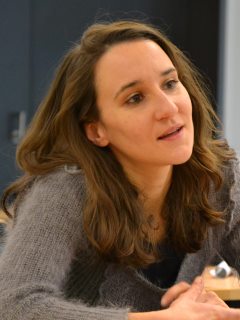This document is unfortunately not available for download at the moment.

Michela Summa
Michela Summa ist Juniorprofessorin für Theoretische Philosophie an der Julius-Maximilians Universität Würzburg. Sie hat 2010 in Pavia und Leuven mit einer Dissertation über "Raum-Zeitlichkeit in Husserls transzendentaler Ästhetik" promoviert. Danach war sie als wissenschaftliche Mitarbeiterin an der Sektion Phänomenologie der Klinik für Allgemeine Psychiatrie in Heidelberg und am Institut für Philosophie in Würzburg tätig. Im Sommersemester 2018 war sie Gastprofessorin an der Universität Kassel. Sie ist Mitherausgeberin des Sammelbandes Imagination and Social Perspectives. Approaches from Phenomenology and Psychopathology (Routledge 2018) und Autorin der Monographie Spatio-temporal Intertwining. Husserl’s Transcendental Aesthetic (Dordrecht 2014). Ihre Forschungsschwerpunkte sind die Phänomenologie der Wahrnehmung und sinnlichen Erfahrung; die Phänomenologie der Subjektivität, der Intersubjektivität und der sozialen Erfahrung; die philosophische und interdisziplinäre Forschung über Gedächtnis- und Imaginationsphänomene; das Verhältnis zwischen Phänomenologie, Kognitionswissenschaften und Psychopathologie.

Thomas Fuchs

Luca Vanzago
Imagination and social perspectives
Approaches from phenomenology and psychopathology
Michela Summa, Thomas Fuchs, Luca Vanzago
Our experience of other individuals as minded beings goes hand in hand with the awareness that they have a unique epistemic and emotional perspective on the experienced objects and situations. The same object can be seen from many different points of view, an event can awaken different emotional reactions in different individuals, and our position-takings can in part be mediated by our belonging to some social or cultural groups. All these phenomena can be described by referring to the metaphor of perspective. Assuming that there are different, and irreducible, perspectives we can take on the experienced world, and on others as experiencing the same world, the phenomenon of mutual understanding can consistently be understood in terms of perspectival flexibility. This edited volume investigates the different processes in which perspectival flexibility occurs in social life and particularly focuses on the constitutive role of imagination in such processes. It includes original works in philosophy and psychopathology showing how perspectival flexibility and social cognition are grounded on the interplay of direct perception and imagination.



